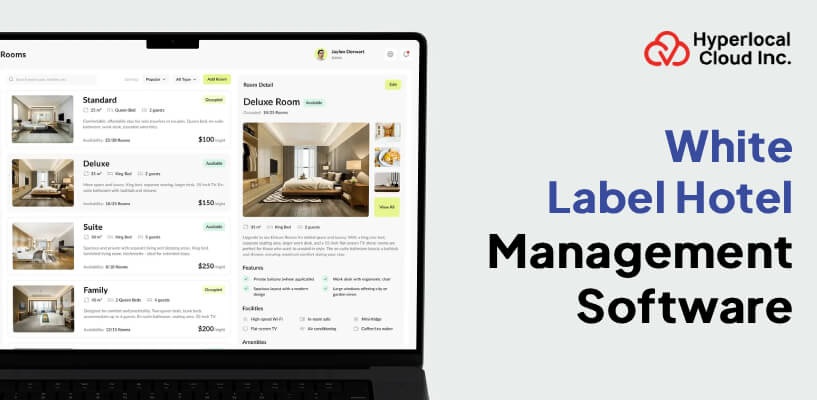White Label Hotel Management System

The hospitality industry has seen huge growth over the past years. The advancement of technology in the digital world has an effective impact on the hospitality market. The hotel management software is in demand because it provides a seamless experience to users by fulfilling their general needs. From convenient booking to customer management to billing, the hotel management software is a multi-tasking platform.
Businesses or startups can go with a white label hotel management software system in order to save cost and time. With these pre-built hotel management platforms, businesses can establish their new brand value and identity. So, by becoming a part of this rapidly growing white label solution for hotel management software, businesses can set a competitive approach in the market.
The blog will further let you know about how you can effortlessly build your own hotel management platform with advanced features and functionalities. You can also get to know about the cost breakdown, revenue model, and use cases for the same. Stay tuned with the blog till the end to clarify your doubts.
What is a Hotel Management System?
A hotel management system is an efficient digital solution that enables hotels, vendors, and users to fulfill their needs. The software typically manages the bookings, reservations, room assignments, billing, customer management, housekeeping, and reporting. The main goal of the platform is to enhance the overall experience of guests and hotel staff.
Have a look at the main components of a hotel management system that make it more productive and lucrative.
1. Booking Engine
The booking engine enables users to book, reserve, or check the availability of hotels. It is a secure method for users to select their desired hotel for check-in.
2. Front Desk Operations
The front desk operations typically manage the check-outs, check-ins, customer management, room management, and guest information.
3. Housekeeping Management
The housekeeping management is typically involved in the cleanliness of the room, so that it becomes ready-to-use for the new guests.
4. Billing and Payments
The billing and payment options analyze payment processing, handle billing, and review financial reports. This, however, will reduce the chances of any kind of error, fraud, or scam in the payment processing.
5. Guest Relationship Management
This option will help the vendor to analyze guest preferences and interests. Based on users’ feedback, the vendors or hotel staff will personalize guests’ experiences.
6. Channel Management
The option helps hotels to manage the bookings of guests from platforms like online travel agents, websites, or booking engines.
Looking for a flexible hotel management system?
Why is it Important to invest in a White Label Hotel Management System?
A white label hotel management software is a proficient business solution for startups that want to reshape the hospitality industry. These solutions are cost-effective and enhance your business’s brand value with efficiency. There are several other factors that indicate the importance of a white label hotel management system.
1. Cost-Effective Solution
A white-label hotel management platform is a cost-effective solution compared to developing one from scratch. With ready-made hotel management solutions, businesses save time because these solutions are already well-tested by tech experts.
2. Quick Market Entry
A white label hotel management software is a ready-to-deploy software that enables businesses to enter the hospitality market quickly and more efficiently, as these platforms are less time-consuming.
3. Customization and Branding
The primary and foremost aspect of a white label hotel management system is that it is fully customized, enabling businesses to brand it according to their business needs. This means businesses can enhance their brand identity with white label solutions by customizing logos, colors, or other elements.
4. Focus on Core Business
A white label hotel management platform only focuses on the core features to facilitate guest bookings, revenue, and customer management. This approach will help businesses to grow in the hospitality market.
5. Scalability
When a hotel management platform is built with a white label solution, it will extend the possibilities of businesses to expand and scale their business effortlessly at an affordable price.
The Working Model of a White Label Hotel Management System
The white label hotel management software is a fully customized, ready-to-use solution that works to meet your business needs. It is often used by businesses to manage their hotels and staff easily without any hassle. However, the working model of a hotel management platform is divided into several parts. Just have a look at one by one:
For Guests
1. Registration
Guests are required to fulfill the registration criteria on the hotel management platform. By providing their details, such as name, phone number, or email address, users can easily complete the registration process.
2. Online Booking
This will allow users or guests to book the rooms online by checking the real-time availability of rooms. Users can complete this process using a hotel management software.
3. Simplifies Check-in/Check-out
The hotel management system makes the check-in and check-out process for guests too easy and convenient. Users are enabled to do this automatically with their mobile phones.
4. Personalized Service
This option enables the hotels to analyze users’ preferences and interests. Based on which hotels will offer their services to the guests in order to fulfill their needs.
5. Efficient Communication
The feature of efficient communication enables the guests to receive real-time notifications about their bookings, rooms, and cancellations through SMS or email.
For Hotel Staff
1. Centralized Data Management
The hotel management system typically acts as a centralized data management system where all the related information about the hotel’s rooms, bookings, availability, guest details, and pricing is stored.
2. Streamlined Reservations
The streamlined reservations enable the hotel management systems to handle all types of bookings, confirmations, modifications, and cancellations.
3. Efficient Room Management
This option enables the hotel staff to ensure room availability, cleanliness, room status, and room assignments, among other things.
4. Improved Communication
To smooth the hotel operations, the hotel management platform encourages improved communication between different departments, like the front desk, guests, and housekeeping.
The Effective Features of a White Label Hotel Management System
The white label hotel management system comes with a wide range of customized, efficient, and advanced features. The detailed overview of its features is mentioned below.
1. Centralized Reservation System
A centralized reservation system allows the hotel staff to manage from all sources, whether it is from the hotel site, the OTA platform, or even guests. It reduces double booking and ensures that the hotel always has an updated scene with room availability.
2. Front Desk Operations
The reception module streamlines the check-in and check-out processes and ensures a seamless experience for the guests. This allows employees to effectively manage guest profiles, payment information, and space functions.
3. Housekeeping Management
Household management equipment, or housekeeping management, allows the hotel staff to track room cleaning and maintenance. The system can assign functions, monitor completion, and ensure that rooms are ready for guests.
4. Channel Management
With the feature of channel management, users are able to check out the future availability of hotels in order to make a reservation. This feature typically works for OTAs (Online Travel Agencies) and indicates overbooking or manual errors.
5. Customer Relationship Management (CRM)
A CRM module helps to track guest preferences, order history, and responses. This information is valuable for providing individual services and promoting customer loyalty.
6. Payment Gateway Integration
The feature of payment gateway integration offers multiple payment options to the users. This means that users are able to pay via cash, credit/debit card, UPI, or digital wallets. This will establish a sense of security and reliability in transactions.
7. Analytics and Reporting
A feature of analytics and reporting enables the admins to detect customer behavior, revenue generation reports, or total bookings. This will help the admins to maintain the quality and performance of the platform.
8. Mobile Accessibility
Mobile facilities allow the hotel staff to manage external operations. From the investigation of guests to the management of household work provides the opportunity to reach the system from smartphones or tablets, with flexibility and increased efficiency.
Want to resell hotel software under your brand?
How AI-Driven Technologies Enhance Hotel Management Software?
AI technologies bring a revolution in the hospitality industry, and they are quickly integrated into hotel management software. This is how AI increases these platforms:
1. Predictive Analytics
AI can analyze the previous data to predict the booking pattern, so that hotels can help adjust the pricing strategies dynamically and optimize the coverage degree.
2. Chatbots for Customer Service
AI-operated chatbots can handle customer issues and requests, provide 24/7 assistance, and improve the general guest experience.
3. Personalization
By analyzing guest data, AI can provide personal recommendations, such as special offers, but also a local experience that fits each guest.
4. Operational Efficiency
AI can automate tasks such as space allocation, household planning, and even maintenance requests, and free employees to focus on more important tasks.
5. Sentiment Analysis
AI-driven sentiment analysis can scan guest reactions and online reviews to identify areas for improving equipment, which can help hotels maintain a positive reputation.
How to Launch a Hotel Management Platform?
There are numerous factors that need to be considered while launching a management platform. The essential ones are precisely discussed below:
1. Identify Your Niche
Before starting a hotel management platform, it is necessary to identify your target audience and analyze competitors. A proper knowledge of the hospitality industry, with ongoing market trends, is essential in order to launch a hotel management platform.
2. Choose the Right White-Label Software Provider
You need to choose a partner that provides a flexible, efficient solution with the ability to customize your brand’s system needs. See a reputed white label solution provider with a proven tracking list, excellent customer support, and a strong technical infrastructure.
3. Integration with Existing Tools
A property management system, a payment portal, and an online booking engine are just a few examples of the devices and services you should make sure the system is initially integrated with. Both hotel employees and visitors will enjoy a seamless user experience thanks to this connection.
4. Onboarding and Training
For the hotel management platform to be implemented successfully, effective training and experience are required. An experienced team will easily handle the app’s complexity and launch it by addressing the business needs.
5. Launch and Monitor
Once everything is done, you can launch the app on the Google Play Store and the Apple App Store. This approach will easily target both Android and iOS users. After a successful launch, it is necessary to monitor the software to see whether it works smoothly or not.
6. Continuous Improvement
Continuous improvement of the platform is required. All you need to do is work on the users’ feedback, which will help the businesses identify their weak points to improve the platform’s performance accordingly.
The Strategies to Monetize the Hotel Management Software
Once you have launched a hotel management software, the next step is to effectively manage it to generate a good income. Here are some strategies that you can consider:
1. Subscription-Based Model
One of the most common ways to muddy a hotel management software is through a subscription-based model. Hotel owners pay a fixed fee on a monthly or annual basis for use. Membership can be eliminated and offers different levels of service and facilities based on hotel size and requirements. For example, a basic package may only include booking engines and reception management, while a premium package can offer advanced analysis, CRM, and multi-property management.
2. Pay-Per-Use Model
In addition to the membership fee, you can charge the hotel on the basis of a refund. For example, you can charge a small fee each time a hotel processes or uses a specific feature (eg, advanced reporting or integration of third parties). This model works well for small hotels or companies that prefer to pay, rather than be obligated to an ongoing membership.
3. Freemium Model
Another approach to generating an income from a platform is a freemium version. The Freemium model is effective in attracting new customers and allowing them to experience the main functions of the platform in return for some amount.
4. Commission-Based Model
Under this strategy, hotels are paid a commission for every reservation made using the hotel management software. It’s a typical strategy for online hotel booking services and is frequently combined with other revenue-generating techniques.
5. Ad Revenue
Depending on the specific requirements for your business, the advertising can be placed on the ad platform and targeted to hotel owners or customers.
6. Partnering with OTAs and Third-Party Services
Another effective way to market a hotel management software is to collaborate with online travel agencies (OTAs) and other third-party service providers. You can get a commission or referral fee by integrating your services into your platform. This may include integration with popular OTA apps like Expedia or Booking.com.
Ready to launch your own hotel brand? Get started with our white label solution now.
How Much Does It Cost for A White Label Hotel Management System?
The average cost of a white label hotel management system starts at $5,000. In this, businesses will gain access to a fast, reliable, and fully customized software that streamlines their business operations. The pre-built solutions are more affordable and less time-consuming, and also help businesses to generate high revenue with a good ROI.
However, if businesses are looking for more complex features and functionalities in the platform, only then do they have to pay an extra amount. Sometimes the selection of a custom software development company also plays an important role in the rise of the cost.
Partner with Hyperlocal Cloud: A Leading White Label Solution Provider
Partnering with Hyperlocal Solutions will always be a beneficial decision for startups and businesses. We offer pre-built solutions that usefully enhance your brand value and boost your user base. Our team of experts is always ready to resolve your queries and provide you with round-the-clock support. We also have proven experience with hotel booking app development, which is always a plus point for us. So, without any delay, reach out to our experts.





